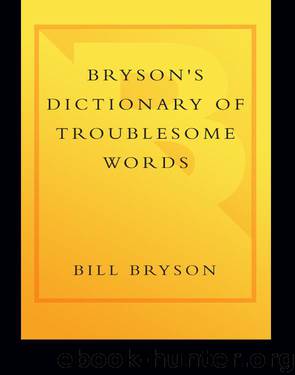Bryson's Dictionary of Troublesome Words by Bill Bryson

Author:Bill Bryson
Language: eng
Format: mobi, epub
ISBN: 9780767910477
Publisher: Crown Publishing Group
Published: 1980-01-10T10:00:00+00:00
O
O, oh. O is confined almost exclusively to religious and poetic contexts. By convention it is always capitalized and never followed by punctuation. Thus if rendering a prayer you would write: “O Lord, who has drawn over weary day the restful veil of night. . . .” Oh is used in all other senses and is normally set off with a comma or commas: “We hunted for him for, oh, seven hours”; “Oh, I think it was a green car.” If a sentence employs a reverential word but is not actually reverential in intent, use oh, as in “Oh, god, I think she’s spotted me” or “Oh, lord, I don’t remember his name.”
oblivious. Fowler, Partridge, and the OED, among others, long maintained that oblivious can mean only forgetful. You cannot properly be oblivious of something that you were not in the first place aware of. But in its broader sense of merely being unaware or impervious, oblivious is now accepted universally.
obsolete, obsolescent. Things that are no longer used or needed are obsolete. Things that are becoming obsolete are obsolescent.
obviate does not mean to reduce or make more acceptable, it means to make unnecessary.
occur, take place. Take place is better reserved for scheduled events. When what is being described is accidental, occur is the better word, as it would have been here: “The accident took place in driving rain” (Guardian).
off of is redundant. Write “Get off the table,” not “Get off of the table.”
Oireachtas for the Irish legislature, consisting of the President and the two assemblies, the Dáil Éireann and Seanad. It is pronounced “ur'-AKH-tus.”
Old Peculier, not Peculiar, for the English beer.
Olympic-sized swimming pool. “. . . and in fitting movie star fashion, the grounds include an Olympic-sized swimming pool” (Mail on Sunday). An official Olympics swimming pool is fifty meters long. Virtually no private person, even in Hollywood, owns a pool that large. The description is almost always a gross exaggeration.
Omar Khayyám is the correct spelling of the Persian poet and mathematician. Note -yy-.
on, upon. Although some journalists think there is, or ought to be, a distinction between these two, there isn’t. The choice is sometimes dictated by idiom (“on no account,” “upon my soul”), but in all other instances it is a matter of preference.
one. “The makers claim that one in 14 people in the world are following the exploits of this new hero” (Sunday Times). In such constructions one should be singular. In effect the sentence is saying: “Out of every 14 people in the world, one is following the exploits of this new hero.” A slightly trickier case appears here: “An estimated one in three householders who are entitled to rebates are not claiming.” (Times). The first are is correct, but the second is wrong. Again, it may help to invert the sentence: “Of those householders who are entitled to rate rebates, one in every three is not claiming.”
one of the, one of those. The problem here is similar to that discussed in the previous entry, but with the difference that here one does not govern the verb.
Download
Bryson's Dictionary of Troublesome Words by Bill Bryson.epub
This site does not store any files on its server. We only index and link to content provided by other sites. Please contact the content providers to delete copyright contents if any and email us, we'll remove relevant links or contents immediately.
Cecilia; Or, Memoirs of an Heiress — Volume 1 by Fanny Burney(32559)
Cecilia; Or, Memoirs of an Heiress — Volume 2 by Fanny Burney(31957)
Cecilia; Or, Memoirs of an Heiress — Volume 3 by Fanny Burney(31943)
The Lost Art of Listening by Michael P. Nichols(7507)
Asking the Right Questions: A Guide to Critical Thinking by M. Neil Browne & Stuart M. Keeley(5778)
We Need to Talk by Celeste Headlee(5617)
On Writing A Memoir of the Craft by Stephen King(4947)
Dialogue by Robert McKee(4406)
Pre-Suasion: A Revolutionary Way to Influence and Persuade by Robert Cialdini(4235)
I Have Something to Say: Mastering the Art of Public Speaking in an Age of Disconnection by John Bowe(3892)
Elements of Style 2017 by Richard De A'Morelli(3351)
The Book of Human Emotions by Tiffany Watt Smith(3310)
Fluent Forever: How to Learn Any Language Fast and Never Forget It by Gabriel Wyner(3088)
Name Book, The: Over 10,000 Names--Their Meanings, Origins, and Spiritual Significance by Astoria Dorothy(2988)
Why I Write by George Orwell(2957)
Good Humor, Bad Taste: A Sociology of the Joke by Kuipers Giselinde(2952)
The Art Of Deception by Kevin Mitnick(2806)
The Grammaring Guide to English Grammar with Exercises by Péter Simon(2747)
Ancient Worlds by Michael Scott(2691)
